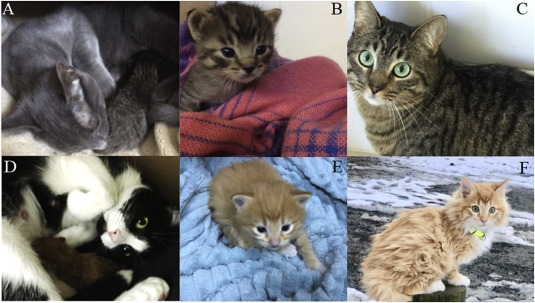They are everywhere, and are invisible to the naked eye, we are talking about microorganisms, such as viruses, bacteria, parasites and fungi, cats are susceptible and can be affected by various infectious diseases, including the much feared feline immunodeficiency (IVF).Unfortunately, IVF remains a fairly common disease today, there are a lot of cats infected with this virus, most live on the street, but some live in homes and may not have been diagnosed with the disease, and may still be alive.with other cats, making them vulnerable to the virus, so we have a lot to know about the issue to surround our kittens from this infection, which if left untreated can be fatal.In order to fight and care for our pets, we need to be attentive and knowledgeable, so Animal Expert wrote this article on “How long does a cat live with IVF?”
This ferocious virus, first found in the United States in the 1980s, affects cats around the world, and is called the IVF Feline Immunodeficiency Virus, and is rated “Lentivirus”, this villain infects the body’s defense cells, T-cells, thus compromising the animal’s immune system, making the feline increasingly likely to develop infections and a number of problems.
- Experts say the occurrence of the virus varies by region of the country.
- The most common form of transmission of IVF or feline AIDS is through saliva.
- Mainly from bite of infected cats.
- That occur during feline fights.
Other less common but possible forms of infection are: intrauterine, that is, when puppies are always generated by the female, by milk through food and by the sharing of food and water containers.
IVF manifests itself in different ways, among symptoms: fever, lack of appetite, runny night, eye secretion, urinary tract infection, diarrhea, skin lesions, in the mouth, in more advanced cases, the animal may develop complications in the respiratory system, renal failure, tumors and cryptococcosis. Between six and eight weeks after infection the acute phase of the disease occurs and these symptoms can be understood for several days or even weeks, but sometimes the cat does not have any symptoms, the diagnosis of this pathology is not so easy, it depends a lot on the stage of the disease, in some cats it is asymptomatic and can take years to manifest itself , diagnosis is performed by laboratory tests.
As for treatment, there are few specific treatment options for felines infected with the virus, it works as a support for disease regression, based on antivirals, fluid therapy, blood transfusion, specific diets, among others.
There is no certainty about the life expectancy of a cat with IVF, because feline immunodeficiency has no cure, treatment serves to make the disease reced, because the animal may lead a healthy life even with IVF.The cat with IVF varies from case to case, the drugs help fight diseases that can occur due to immune system failures, treating these diseases and controlling them so that the feline is no longer affected by others, the animal can live well and healthy.It is important to remember that care should be taken with cat food, an animal with IVF needs a different diet.
The best way to combat this virus is to combat and prevent it, some basic measures must be taken.In cats infected with the virus, in the first step, the use of antiviral drugs is recommended, with the aim of reducing and replicating the virus, this can help reduce the severity of symptoms and in the rehabilitation of felines.
Preventing animals from reproducing without birth control is an important measure, not only in the prevention of feline immunodeficiency, but also in the control of other diseases to which stray cats are susceptible, since it is taken care of, takes care of custody, then all overpopulation of cats increases day by day.Having a suitable environment for well-ventilated felines with the resources, water, food and bed necessary for their survival is essential, it is also important to avoid what they have access to the street, in addition to keeping vaccination up to date, both in puppies and adults.
This article is for informational purposes only, in Animal Expert.com.br we cannot prescribe veterinary treatments or make any type of diagnosis, we suggest that you take your pet to the veterinarian in case of any condition or discomfort.
If you would like to read articles similar to, we recommend that you visit our Viral Diseases section.

